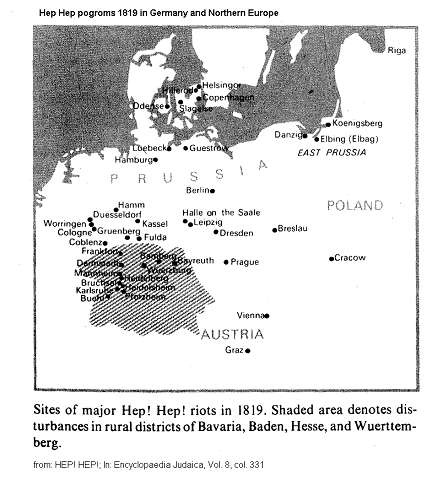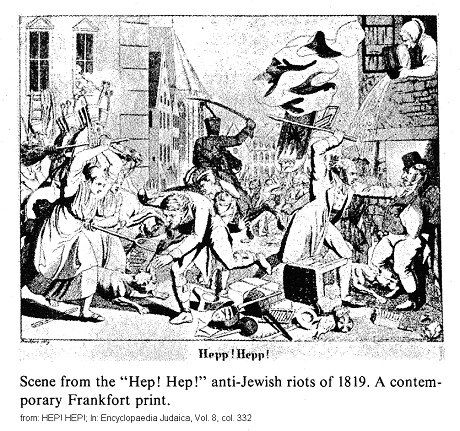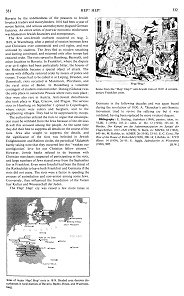Prosecution of the Jews: Hep Hep pogroms 1819 in Germany and Northern Europe
Pogroms against the emancipation of the Jews and the Jewish bank system in connection with famine and unemployment
Hep Hep pogroms of 1819 in Germany and Northern Europe, map
from: Hep! Hep!; In: Encyclopaedia Judaica 1971, vol. 8
presented by Michael Palomino (2007)
| Teilen
/ share: |
Facebook |
|
Twitter
|
|
|
|
[The background of the slogan Hep Hep]
<HEP! HEP!, a derogatory rallying cry against the Jews, common in Germany; also the name given to a series of anti-Jewish riots that broke out in August 1819 in Germany and spread to several neighboring countries. Opinions differ as to the origin of the slogan. Some believe that it was the crusaders' rallying cry, derived from the initials of Hierosolyma est perdita ("Jerusalem is lost"). However, more likely it was originally an exhortatory cry for driving domestic animals, particularly goats, on Franconia.
[Causes of the pogroms: Jewish civil rights - new Jewish bank system - famines - unemployment]
The causes of the 1819 riots are highly complex and are rooted in the social and economic condition of Germany in the early 19th century. The Jewish demand for civil rights at the Congress of *Vienna aroused vicious opposition in academic circles. The anti-Semitic fulminations of J. *Fries were read aloud in the beer houses and the anti-Jewish extremism of F. *Ruehs was vigorously supported by the nationalistic Burschenschaften (see *Students Associations).
Romantic writers and liberal nationalist politicians such as H. *Hundt-Radowsky, E. M. *Arndt, Father *Jahn, etc., identified the Jews with the conservative, anti-nationalist policies of *Metternich, who was accused of being in the pay of Jewish financiers. The bitterness of the population toward the new "upstart" class of Jewish financiers and bankers was expressed by K. B. A. *Sessa in a popular play, Unser Verkehr ("Our Crowd", 1815).
The situation was further complicated in the rural areas of Baden, Hesse, and (col. 330)
Bavaria by the indebtedness of the peasants to Jewish livestock traders and moneylenders. 1816 had been a year of severe famine, and serious unemployment plagued German factories. An entire series of postwar economic misfortunes was blamed on Jewish financiers and entrepreneurs.
[The pogroms and riots 1819]
The first anti-Jewish outburst occurred on Aug. 2, 1819, in Wuerzburg, after a period of tension between Jews and Christians over commercial and civil rights, and was initiated by students. The Jews fled as window smashing and looting continued, and returned only after troops had restored order. The riots spread to Bamberg, Bayreuth, and other localities in Bavaria. In Frankfort, where the dispute over civil rights had been particularly bitter, the houses of the Rothschilds became a special object of attack.
The senate with difficulty restored order by means of police and troops. Troops had to be called in at Leipzig, Dresden, and Darmstadt; riots occurred in Mannheim, Pfortzheim, and the rural areas of Baden. In Heidelberg a volunteer contingent of students restored order. Danzig (Gdansk) was the only place in autocratic Prussia where riots took place; they were also rare in Austria.
Anti-Jewish disturbances also took place in Riga, Cracow, and Prague. The serious riots in Hamburg on September 1 spread to Copenhagen, where rioters were sailors and burghers, and to the neighboring villages. They had to be suppressed by troops.
[The authorities are using the riots to cut Jewish rights because of danger of riots]
The authorities utilized the riots to argue that emancipation must be withheld from the Jews because of the obvious ill-will this aroused among the people. At the same time they did their best to suppress all details on the course of the riots. Jews also sought to suppress the details, and the significance of the riots was belittled in Jewish Enlightenment and Reform circles, the periodical *Sulamith barely taking note that they occurred lest this "weaken our coreligionists' love for our Christian fellow citizens".
[Jewish banks and the Rothschilds are acting]
However, Jewish banks refused to do business with Christian merchants suspected of participating in the riots, and large numbers of Jews stayed away from the September fair in Frankfort. Even more forceful had been the threat of the Rothschilds to leave both Frankfort and Germany if the riots did not cease.
[Inner Jewish effects of the riots]
The riots were a factor in speeding the process of assimilation and conversion among some Jews. Conversely, they influenced the foundation of the Verein fuer Kultur ujnd Wissenschaft der Juden.
[More Hep Hep pogroms - replacement by other slogans]
The Hep! Hep! cry was raised a few more times in (col. 331)
Germany in the following decades and was again heard during the revolution of 1830. A. *Stoecker's anti-Semitic movement tried to revive the rallying cry but it was outdated, having been replaced by more virulent slogans.
Bibliography
-- E. Sterling: Judenhass (1969), passim;
-- E. Sterling, in: YLBI, 3 (1958), 103-21
-- E. Sterling, in: JH, 12 (1950), 105-42
-- H. Bender: Der Kampf um die Judenemanzipation im Spiegel der Flugschriften, 1815-1820 (1939)
-- S. Stern, in: MGWJ, 83 (1963), 645-66
-- M. Kohler, in: AJHSP, 26 (1918), 33-81
-- E. C. Corti: The Rise of the Hosue of Rothschild (1928), 208-14
-- Lifschits, in: YIVO Bleter, 14 (1939), 26-45
-- U. Jeggle: Judendoerfer in Wittenberg (1969), 99ff.
| Teilen
/ share: |
Facebook |
|
Twitter |
|
|
|





